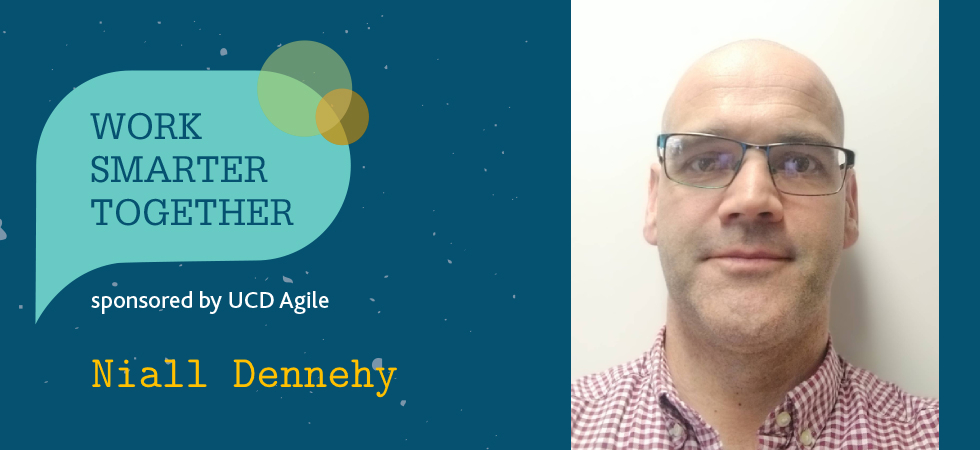A Day in the Life – Niall Dennehy

Who are you?
My name is Niall Dennehy. I’m from Carlow but live in Dún Laoghaire with my wife and two daughters.
How did you get here? What was the journey to UCD?
I began working in UCD somewhat by accident. 17+ years ago, I had been away travelling after college for a few months, and on the morning that I was going to organise a job and a place to live in Carlow, a friend who was working here rang me to say there was a short term job going in a School here. I rang to enquire, and started a few days later. They must have been stuck!
What is your role within UCD, and what are your main responsibilities?
I’m currently the project manager for the Student Mental Health and Suicide Prevention Project, based in UCD SECCA.
Could you briefly describe what a typical day looks like for you?
What exactly I’m doing on a given day varies depending on what’s happening with the project. There can be days when I feel I’m rarely off my email, and other days where it’s more a case of getting through documentation, reports etc. Where I’m probably at my most comfortable is in front of a whiteboard with a couple of other people, trying to draw out a solution to a problem or map out a process so improvements can be made.
What are some of the most interesting or challenging tasks you encounter on a regular basis? Why are they unavoidable?
I have had to be disciplined about documenting what has been done before getting stuck into the next task. I’m very passionate about the work that this project is undertaking, and there is great momentum and enthusiasm from all the stakeholders involved. Therefore, there’s no shortage of impetus to move on to the next challenge, but the processes behind accomplishing goals along the way have to be recorded.
Are there any specific projects or initiatives you or your unit are currently working on that you would like to share?
The scope of the project is quite wide ranging, as it involves a whole university approach. One key part that will make a real difference to students is reviewing and improving how we engage with them in relation to wellbeing and mental health supports, and how we enable them to engage with the range of supports available to them. We’re very fortunate in UCD to have a wide range of supports available to students. This does mean, however, that it can sometimes be difficult for a student to navigate the support landscape, particularly at times when they need some help. We’ve conducted some really valuable consultations with students on this area and are developing ways to make this navigation easier, in response to what they’ve told us. I’m very excited about seeing this come to fruition.
Is there a process or element of your work that you would improve or change?
I regularly get bursts of enthusiasm for getting up from the desk and moving around for a few minutes each hour. I always find it great for energy and concentration levels, but it slips then after a while!
Could you share a memorable experience you’ve had while working in UCD?
I spent many happy years in the Arts & Humanities College Office. While I was still fairly junior there, a student came in to drop a resit and was clearly frustrated and a bit upset. It was a core module for a subject that he said he otherwise liked, but was adamant that he’d never pass this element. We’d a good chat and he decided to give the resit another go, just to try to get over the line on it. A few years later, he stopped me walking through campus to tell me that he was here attending a conference related to that subject, having gone on to complete postgraduate studies in it elsewhere. For me that’s the special thing about working in UCD. We have opportunities to help students in the course of our day to day work at potentially pivotal times in their studies and/or lives.
Is there a particular skill or expertise that helps you in your role and what advice would you give to someone starting in a similar role?
Take your time at the beginning. UCD is a big, complex place, with a lot of people doing a lot of really good things. Observe and try to understand what’s going on before rushing headlong into anything. It’s always easy to change up the gears in time, but the bull in a china shop approach doesn’t work.
How do you collaborate with other teams or colleagues in your day-to-day work?
There are a significant number of people contributing to the work of the project, so Google Docs for collaboration and comment is a staple.
Are there any common misconceptions about your role?
Probably!! 🙂
How do you see your job changing over the next ten or twenty years?
Project management tools are becoming far more user-friendly, intuitive and suitable for smaller projects. Some of the more traditional planning and reporting tools would need a separate project team to manage! I think PM tools and project management ‘thinking’ will become more embedded in the way we do things in all areas of the University.
If your job had a theme song or soundtrack, what would it be [and why]?
I’m tempted to say “What’s Another Year” as an ode to project timelines but I won’t! I listen to quite a bit of upbeat Northern Soul classics when I do take those short breaks to keep the energy levels up, or when I’m working at home to avoid the mid afternoon slump! So if you see me doing a power lap of the lake with a bit of a swagger, it could be to “The Night”, by Frankie Valli and the Four Seasons!
